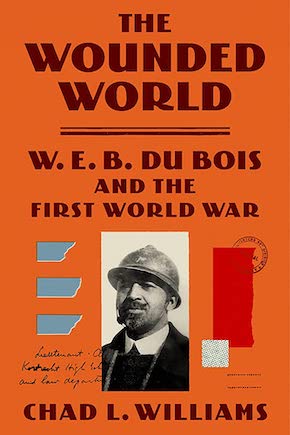'The Wounded World': Du Bois' forgotten work on WWI
 Photo/Getty Images
Photo/Getty ImagesW. E. B. Du Bois
In the fall of 2000, Chad Williams was hunting through records at the W. E. B. Du Bois Library at the University of Massachusetts when he made a stunning discovery.
Williams, a PhD candidate at Princeton University at the time, was researching for his dissertation on Black soldiers in World War I. When he sought a collection labeled “Du Bois World War I materials,” the librarian returned with something almost unbelievable: Six reels of microfiche containing an 800 page unfinished and unpublished manuscript by Du Bois on the Black experience in World War I. It was called "The Black Man and the Wounded World.”
Williams, now the Augusta Spector Chair of History at Brandeis and a preeminent scholar of World War I, has returned to those materials in his newest book, "The Wounded World: W. E. B. Du Bois and the First World War," released in April.
He took some time to discuss the book with BrandeisNow.

Chad Williams
Why is this story important, and how did it go so long without being told? In what ways do you see it being applicable to modern issues?
“The Wounded World” fills a major void in our understanding of W. E. B. Du Bois's life, intellectual work and political evolution. Most Du Bois scholars were not aware of his unfinished book on the history of the First World War, and those who did know of it had not explored its full importance. The story I tell presents Du Bois in all of his brilliance and complex humanity, attempting to write about the Black experience in the war over the course of two decades shaped by hope, disillusion and failure. The issues he wrestled with in trying to write his book--racism and white supremacy, the tension of African American identity, the pressures of loyalty and patriotism, the horrific costs of war--are all issues that remain deeply relevant today.
As you were researching this, reading through the manuscript and Du Bois' numerous correspondence, were there any moments or exchanges you found particularly exemplary of his personal character?
Du Bois possessed a massive ego. He believed that he--and ultimately he alone--could accurately write the history of the Black experience in the war. This led to conflicts with other Black scholars, as well as with many Black veterans, who placed their trust in Du Bois to tell their story. Many Black veterans gave Du Bois personal and invaluable materials to use in his book which he selfishly never returned. “The Wounded World” allows readers to vividly experience Du Bois's full personal character, including his flaws.
What is the key reason or reasons Du Bois failed to complete "The Black Man and the Wounded World?" Was it about a lack of funding? His personal disillusionment with the War? Something else?
Certainly practical matters, such as a lack of funding, played a role. But, without giving away too much, Du Bois was haunted by his decision to support World War I and the utter failure of the war for Black people and the entire world. As I chronicle in my book, he struggled on both a personal and intellectual level to make sense of what he ultimately came to see as a completely senseless war that created a wounded world. The war proved to be a subject too big, too personal and too disillusioning for even the great W. E. B. Du Bois to master.

How did his experience with WWI influence his stance on future conflicts and war in general?
As I chronicle in “The Wounded World,” Du Bois's experience with World War I was key to his views on war and evolution as a peace activist. The disillusionment of World War I, combined with his guilt for supporting it, hardened his anti-war beliefs. He came to envision "The Black Man and the Wounded World" as a lesson about the horrors of modern warfare. World War II confirmed the complete failure of the First World War, and while Du Bois grudgingly accepts that Black people will do their part, he is deeply cynical and believes it will have no positive outcome. By the 1950s, as the threat of atomic war looms, Du Bois is at the forefront of the international peace movement.
This book includes Du Bois' encounters with numerous historically significant people, organizations, and events. Was there anything, or anyone, you came across that you feel is particularly under examined or under recognized today?
Although Du Bois is the main character of “The Wounded World,” Black veterans play important roles in this story. While the experiences and impact of Black veterans of World War II is widely recognized, the importance of Black veterans of World War I is less well known. In a multitude of ways they shaped African American history in the 20th century and laid the foundations for the modern Black freedom struggle.
Categories: Humanities and Social Sciences, Research





